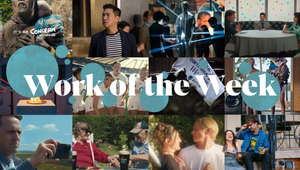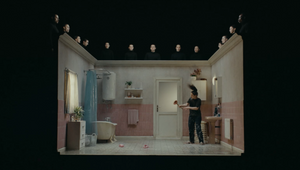
Supreme Music Asks Andy Wölfl: And What About Music?

Creative director Andy Wölfl has built a career translating complex ideas into vivid, emotionally resonant visuals. Working at the intersection of motion design and illustration, his process is deeply influenced by music—not just as background, but as a core driver of mood, storytelling, and connection. In this conversation, he reflects with Kat Wyeth on his formative role of MTV, the power of global sounds, and why music deserves a central role in the creative process
Q>Please tell us your name and what you do professionally.
Andy>My name is Andy Wölfl. I’m a creative director working at the intersection of motion design and illustration. I help brands, companies, and organizations break down complex concepts into simple, engaging visuals—mainly through motion design and illustration.
Q>Is there a piece of music that changed the trajectory of your creative thinking? How did it reshape your approach to your work?
Andy>I can’t point to one specific piece of music, but rather to a whole medium: music videos. When MTV arrived, it completely changed how I experienced music—it added a visual component that made it feel more immersive and alive. Whether it was the music videos themselves or the bumpers in between, MTV sparked my appetite to create fantastical worlds where music and visuals merged in ways I hadn’t seen before. Looking back, it felt like peering through a window into another dimension—like Alice in Wonderland. Everything was vibrant, surreal, and unexpected. As a kid, it was probably the closest I ever came to experiencing synaesthesia or something psychedelic.
Q>What is specific when it comes to combining sound, music and illustration?
Andy>Music connects with us on a deep emotional level—it sets the tone and mood instantly. In motion design and video, I truly believe that sound is more than half of the experience. When I work on personal projects, the initial spark often comes from a song. Music, video, and sound design together create a unique emotional depth. When combined intentionally, the result becomes more than just the sum of its parts.
Even when working on still illustrations, I listen to music that evokes the same feeling I want to express. It guides my decisions and enhances the whole creative process. It might be a private, internal experience while I work—but I believe that energy transfers into the final piece.
Q>Is there a song or piece of music you wish you had created or used in your work? What makes it special to you?
Andy>There are hundreds—maybe thousands—of songs I’d love to use, each perfect for a specific idea or emotion. When working on client projects, I often start by choosing a track that sets the overall vibe, then I build the visuals around it. Unfortunately, budgets rarely allow for licensing the exact song, so I usually have to find something similar or work with sound designers to recreate the mood.
Q>How has your relationship with music or sound evolved throughout your career? Has your approach to selecting or incorporating music changed over time?
Andy>Moving to Barcelona 15 years ago completely shifted my musical perspective. As a teenager, I was heavily influenced by American culture and music, but here I was exposed to traditional sounds from all over the world—thanks to the incredible street musicians who fill the city with life. I discovered music from South America, Africa, and across Europe. What struck me most was how music can bring people together, regardless of language. I didn’t play an instrument, but I wanted to participate—so I started filming and documenting what I saw and heard. That led to my diploma project, which I created in collaboration with the band El Tumbao de Juana.
Later, I co-founded Camping Bus Records—a one-year journey through South America in a vintage Volkswagen bus we turned into a mobile recording studio. Along with two friends, including a sound engineer, we recorded musicians in remote villages. Our goal was to show that music isn’t just about fame or money—it’s about connection, joy, and living in the moment.
All of these experiences deeply shaped how I view my creative practice today. For me, it’s all about connection—just like music.
Q>Is there a musical approach or trend in advertising that you believe is overdone or misunderstood? What would you like to see more of instead?
Andy>But music has the power to move people on a profound level. It’s astonishing how often that potential is overlooked. I still remember certain TV ad jingles from my childhood—they’re burned into my memory. That kind of impact is rare today, and it’s a missed opportunity. I’d love to see brands treat sound and music with the importance they deserve—from the very beginning of the creative process.















